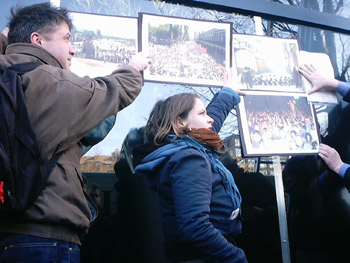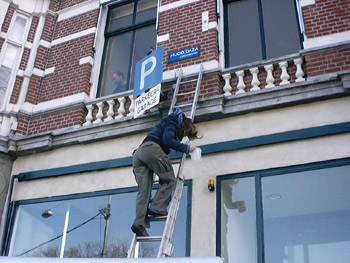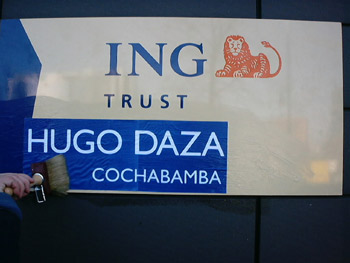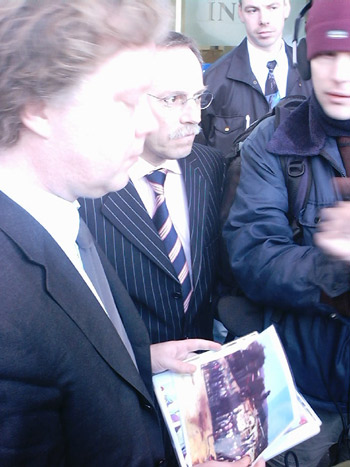
| Home Page / News / Fact File / Web Links | Nederlandstalig |
 |
Today a group of local activists has taken action against a letterbox company based in Amsterdam, the Netherlands. The letterbox company, International Water Holdings BV, holds 55% of the shares in Aguas del Tunari S.A., the company that was put out of business by the people of Cochabamba in April 2000 after having operated the privatised municipal water company for a few months. |
In December 2001, International Water Holdings BV brought a case before the World Bank's International Centre for the Settlement of Investment Disputes (ICSID), demanding 25 million dollars of 'recompensation' from the Bolivian government. Bolivia is one of the poorest countries of Latin America.
 |
The activists changed the street sign on the wall of the letterbox office into "Hugo Daza -- Cochabamba". The 17-year old student Victor Hugo Daza was shot dead on April 8, 2000 by an army sniper during the mass street protests in Cochabamba that led to the forced departure of Aguas del Tunari. |
 |
Afterwards, the activists went to the main office of ING Trust, at Teleportboulevard 140, Amsterdam. ING Trust is administering International Water Holdings through its daughter trust company Intra Beheer BV. |
 |
After a short while, two company officials appeared at the door. The activists showed them pictures of the Cochabamba water uprising and demanded that ING Trust ensure that International Water Holdings withdraws its claim at ICSID under the Dutch-Bolivian bilateral investment treaty. ING Trust / Intrabeheer promised to give an official reaction within two weeks. |
The activists call upon the Dutch government to take measures against such letterbox companies and to prevent the misuse of bilateral investment treaties to extract money from the poorest people in the South.
Soon after the privatisation of the Cochabamba water company in November 1999, the new owner, Aguas del Tunari, doubled or in some cases even tripled water tariffs, without improving services. Under a secret agreement, Aguas del Tunari had even the right to ask money for water collected independently through cisterns or from available surface water. As a result of the water uprising, the privatisation had to be rolled back and Aguas del Tunari was forced to leave the town. Since then, the Cochabamba water company has been successfully run by local citizens councils. Aguas del Tunari asks the Bolivian government 25 million dollars in recompensation: at least more than three times the actual sum they paid for the Cochabamba water company.
As Aguas del Tunari didn't succeed to get the money through direct negotiations with the Bolivian government, the claim is now brought before the World Bank's International Centre for the Settlement of Investment Disputes (ICSID). Bechtel and Edison, the majority owners of Aguas del Tunari, own their shares through the Amsterdam-based financial holding company International Water Holdings BV. Besides providing Bechtel and Edison with a favourable tax regime, the intermediary holding in the Netherlands also enables them to make use of the 1992 Dutch-Bolivian bilateral investment treaty, which relegates all unsolved disputes between Dutch investors and Bolivian authorities to the World Bank's dispute settlement body.
On February 25, 2002, the case was officially accepted by ICSID. According to the ICSID web site, the three person expert tribunal still has to be nominated. In this particular case the World Bank is far from neutral, as it was the World Bank which pressured the Bolivian government to privatise the country's water sector.
In the annual report of International Water Holdings over the year 2000 (filed at the Amsterdam Chamber of Commerce), the company explained that they were, "in the process of filing a claim for the recovery of its investment, related costs and lost profits under the 'Agreement on Encouragement and Reciprocal Protection of Investments Between the Kingdom of the Netherlands and the Republic of Bolivia' (the Treaty). In accordance with the Treaty, the Group is in the process of submitting a request for arbitration to the International Centre for Settlement of Investment Disputes (ICSID). On the basis of legal opinions received, the Group believes that it will recover an amount in excess of the Group's total carrying value of Aguas del Tunari (of EUR 7.613.000) as a settlement of its claim against the Government of Bolivia. However, the success of this action for recovery depends substantially on obtaining ICSID jurisdiction."
Apparently the difference between the booked loss of 7.6 million euro (approx. 6.5 million US dollar) and the 25 million dollar claimed from the Bolivian government must fall under the heading "lost profits", the profits that the company expected to make when gaining the 30-year concession to run the Cochabamba water and sewer system. "Our dream is a world without poverty," says a banner heading the World Bank / ICSID web pages. By accepting the outrageous claim against the Bolivian government for arbitrage, the World Bank is in reality very close to legitimising corporate racketeering of the world's poor.
The ING trust subsidiary, Intra Beheer BV, which administers International Water Holdings BV, has an international reputation for being involved in shady dealings. For example, a September 2000 report, commissioned by the Amsterdam-based NGOs Transnational Institute and Dutch Indonesia Committee, asserts that Intra Beheer BV was involved in funnelling off millions of dollars on behalf of the Indonesian Suharto family.
The Amsterdam activists plan to organise an international tribunal on this case of Dutch complicity in corporate racketeering. International experts and activists and representatives of the Cochabamba people will be invited to testify against the role of the Dutch state, the transnational corporations Bechtel and Edison and the World Bank.
Contact: XminusY Solidarity Fund
Keizersgracht 132 / 1015 CW Amsterdam / tel: +31-20-6279661 / e-mail: kh@xminy.nl